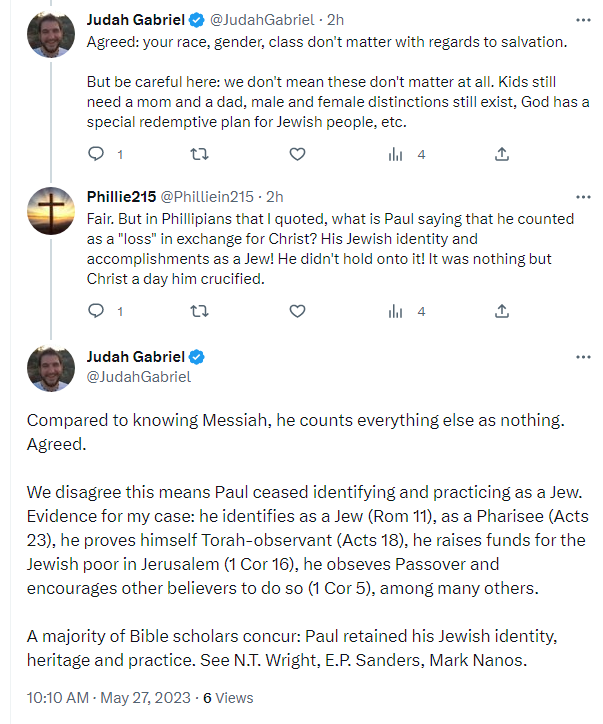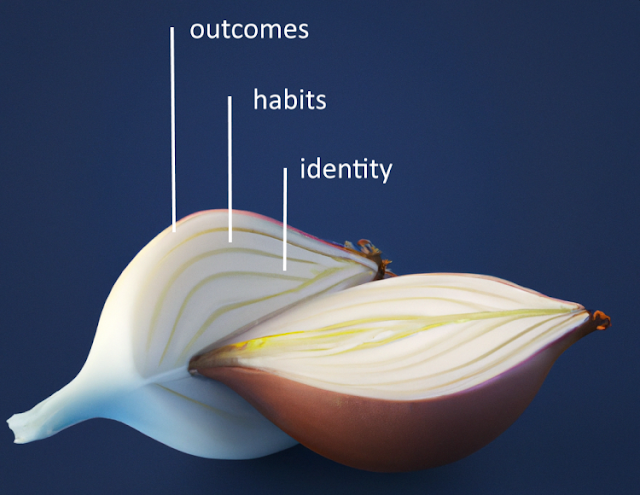Babylon Bee CEO Seth Dillon was "outed" as Jewish this week.
Why isn’t the Christian Babylon Bee run by a Christian? pic.twitter.com/p2mNUDOwXx
— Jon Miller (@MillerStream) May 27, 2023
I say outed loosely: Dillon is the one who publicly made it known he has Jewish heritage; it's not some secret that the anti-Semites uncovered through careful investigation.
Dillon replied,
I did not cease having Ashkenazi blood when I put my faith in Jesus Christ (also a Jew). https://t.co/cDCQOFUV5K
— Seth Dillon (@SethDillon) May 27, 2023
I liked Dillon's response about not ceasing to be Jewish when following Jesus the Jew. I chimed in,
That triggered Christian anti-Semites to start chiming in with thoughtful replies like:
- "There are Jewish Torah scrolls decorated with Satanic symbols!"
- "Secular Jews are preaching the art of Satanism"
- "Pretty sure Jesus called you lot the synagogue of Satan a few times tho right?"
- "There is zero connection between Woody Allen and the ancient people of Judea that practiced the religion of the Second Temple."
- "The satanic symbols on a jewish torah is used by the church of Satan today, which was founded by a jew. Connect the dots!"
- "You're a zio-shill"
- "the apostles didn't have a talmud"
- "You're stupid and that's not my problem"
Identity
- He says there is "much advantage to being a Jew, and much value in circumcision", arguing God has chosen Jewish people to be entrusted with the Scripture itself. (Rom 3)
- He calls himself a Jew in Romans 9-11
- He calls himself a Pharisee in Acts 23
- He takes a collection for the Jewish poor in Jerusalem among the Gentile congregations (1 Cor 16).
- He argues that Gentiles should share physical resources and money with Jewish believers, since Jews shared in spiritual inheritance with Gentiles.
- He celebrates Jewish feasts and encourages others to do so (1 Cor 5)
- He takes a Torah-prescribed vow in the Temple and pays for others to do the same "so that all will know there is no truth to these reports that you teach contrary to the Torah, but you yourself are living in obedience to it." (Acts 21).
- He says that while some Jews who reject Messiah act like enemies to Christians, "they are still loved by God for the sake of the patriarchs" and that God's calling on Jews is irrevocable. (Romans 11)
- He says Jewish people specifically will receive mercy from God in the end (Romans 11)
- He submits to Jewish religious discipline in Acts.
- He says God has not rejected his own people, the Jewish people (Rom 11).
Counted all [Jewishness] as loss
If someone else thinks they have reasons to put confidence in the flesh, I have more: circumcised on the eighth day, of the people of Israel, of the tribe of Benjamin, a Hebrew of Hebrews; in regard to the law, a Pharisee; as for zeal, persecuting the church; as for righteousness based on the law, faultless.But whatever were gains to me I now consider loss for the sake of Christ. What is more, I consider everything a loss because of the surpassing worth of knowing Christ Jesus my Lord, for whose sake I have lost all things. I consider them garbage, that I may gain Christ.
-Paul, Philippians 3
The interpretation here is that Paul is saying Jewish identity and Jewish religious credentials don't matter.
I do not think Paul is saying that, and for many of the reasons cited above. Rather, Paul is saying they don't gain you eternal life with God.
The context of this passage is important. Paul is addressing the Christian Judaizers who said you must be circumcised (convert to Judaism) to be saved and have eternal life with God. The opening verses of this chapter includes Paul's warning, "Watch out for those dogs, those evildoers, those mutilators of the flesh. For it is we who are the circumcision..." -- this is speaking about those Christians who were saying Gentiles must be circumcised and convert to Judaism before they could be considered Christians.
We're confident this was a major question in the early Church, attested to in Acts 15 and several other places in the New Testament: do non-Jews who follow the Jewish Messiah need to convert to Judaism (i.e. undergo circumcision) to be part of God's family? (And by extension, if a Gentile doesn't get circumcised, is he saved? Will he have eternal life with God?) That's the important context of this passage.
Paul's answer is a vehement no. New Gentile Christians do not need to convert to Judaism and undergo circumcision to be part of God's family.
It is in this context Paul says all his Jewish credentials -- his training in the synagogue as a Pharisee zealous for the law -- were worthless. He thought he was living righteously, but he was without Messiah. Paul is arguing outward religious acts and religious identity can't save that person from the wrath of God for our sins. Rather, those who believe and are indwelt by the Spirit of God -- it's those people who are saved. Everything else is counted as loss.
It's Paul's version of, "What good is it for a man to gain the world and lose your soul?" Paul "gained the world", Jewishly speaking, but had lost his soul in persecuting the followers of the real Jewish Messiah.
Takeaways
There are a lot of Christian anti-Semites on the web. I can confidently label them anti-Semites: they are part of "groyper" groups: white nationalists, far-right racists. Their profile pictures feature stereotypical Jews with long noses, but in lizard skin. (A combo of conspiracy theories!) Their tweets feature sympathy for Adolf Hitler, claims the Holocaust was fabricated, anti-Zionist propaganda, etc. From their responses, they don't have deep Biblical literacy. They mostly appeal to special interpretations of a handful of verses (synagogue of Satan, certain rebukes of Pharisees, etc.). Dig a little, and you'll find their well is empty.Many Christians feel the New Testament does away with Jews, Jewish identity, Torah, the Old Testament, and Judaism itself. This is replacement theology, also called supercessionism.
These folks are not necessarily anti-Semites, but have a certain view of Scripture that replaces Jews and Judaism with the Church and Christianity. These people are probably worth engaging in gentle discussion. Some of those I engaged proved fruitful discussions, finding some common ground even if we disagreed on details.
If there's something we can pray, it's that God gives all of us wisdom and discernment in this age of wild foolishness and rampant deception.










